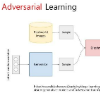Equalized odds, as a popular notion of algorithmic fairness, aims to ensure that sensitive variables, such as race and gender, do not unfairly influence the algorithm prediction when conditioning on the true outcome. Despite rapid advancements, most of the current research focuses on the violation of equalized odds caused by one sensitive attribute, leaving the challenge of simultaneously accounting for multiple attributes under-addressed. We address this gap by introducing a fairness learning approach that integrates adversarial learning with a novel inverse conditional permutation. This approach effectively and flexibly handles multiple sensitive attributes, potentially of mixed data types. The efficacy and flexibility of our method are demonstrated through both simulation studies and empirical analysis of real-world datasets.
翻译:暂无翻译



